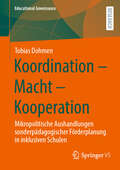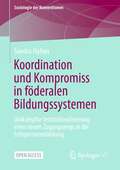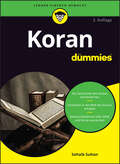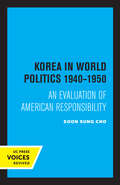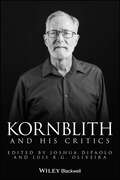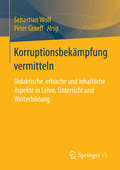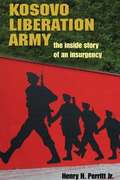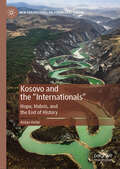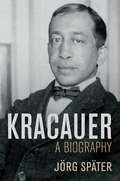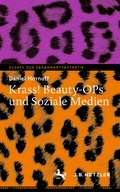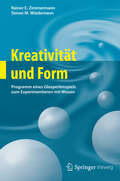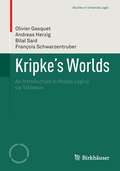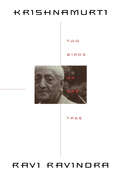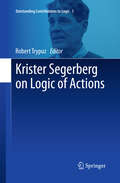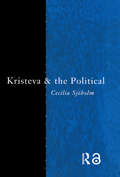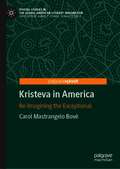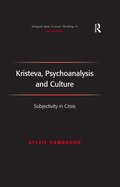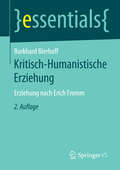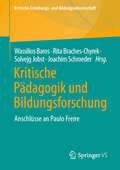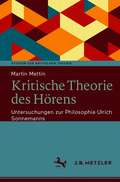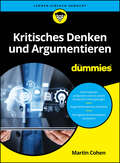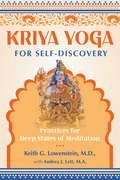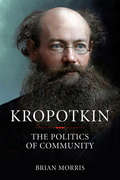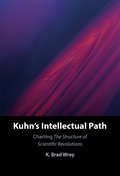- Table View
- List View
Koordination - Macht - Kooperation: Mikropolitische Aushandlungen sonderpädagogischer Förderplanung in inklusiven Schulen (Educational Governance #60)
by Tobias DohmenDieses Buch präsentiert eine Grounded Theory Studie, die das Verfahren der sonderpädagogischen Förderplanung an inklusiven Schulen in Nordrhein-Westfalen untersucht. Analysiert wird, wie sonderpädagogische Lehrpersonen und Regelschullehrer*innen anlässlich eines verordneten Kooperationsauftrags Informationen über Schüler*innen tauschen. Als ein Abstimmungsmechanismus wird herausgearbeitet, wie sich die beteiligten Lehr*innen mittels Verhandlungsstrategien darüber einigen, wie ihre individuellen Beiträge in die kooperative Erstellung der Förderplandokumente einfließen.Die Forschungsarbeit schließt in einem organisationssoziologischen Zugang an der Tradition einer „schulbezogenen Kooperationsforschung“ (Idel et al. 2012, 10) an und erweitert diese um mikropolitische Perspektiven auf die regulativen Verhältnisse inklusiver Lehrer*innenkooperation. Anhand der Rekonstruktion organisationaler Mikropraxen wird die „Frage der Handlungskoordination, der Art und Funktionalität des Zusammenwirkens verschiedener Einzelbeiträge zur Koordination und Entwicklung des Gesamtsystems“ (Altrichter et al. 2005, 7; Hervorheb. i. O.) fokussiert.
Koordination und Kompromiss in föderalen Bildungssystemen: Umkämpfte Institutionalisierung eines neuen Zugangswegs in die Lehrpersonenbildung (Soziologie der Konventionen)
by Sandra HafnerIn vielen Ländern bereitet traditionell das Gymnasium auf die Lehramtsausbildung vor. Diese multimethodische Open Access Studie befasst sich mit der umkämpften Institutionalisierung eines zweiten, alternativen Zugangswegs (Fachmittelschule) in die Lehrpersonenbildung in der Schweiz. Mit der Analyse von Kritik, Konflikt und Kompromiss werden Prozesse der Harmonisierung von Bildung bei gleichzeitiger Bewahrung von regionalen Eigenheiten untersucht. Die Studie leistet damit einen Beitrag zur Erklärung von bildungspolitischer Handlungskoordination in föderalen Bildungssystemen.Ebenso nimmt die Studie die Fachmittelschule und das Gymnasium vergleichend als schulische Dispositive in den Blick. Anhand von Fallstudien wird gezeigt, wie die beteiligten schulischen Akteur*innen diese Dispositive konstruieren und (de-)valorisieren, und wie daraus unterschiedliche Sozialisationsumgebungen für Jugendliche entstehen. Auf dieser Grundlage lässt sich die unterschiedliche Bedeutung der beiden Schultypen für die Lehrpersonenbildung erklären. Damit wirft die Studie eine neuen, konventionensoziologischen Blick auf Schulkultur(en) als Wertigkeitsdispositive und ermöglicht eine institutionelle Perspektive auf die Formung von Berufs- und Studienwahlmotiven.
Koran für Dummies (Für Dummies)
by Sohaib SultanAlles Wissenswerte über die heilige Schrift des Islam Der Koran ist die heilige Schrift von über 1,8 Milliarden Muslimen auf allen Kontinenten. Er ist die Offenbarung Allahs an den Religionsstifter Mohammed, hohe Literatur und zugleich Leitfaden für das tägliche Leben der Gläubigen. Was sagt der Koran über den Glauben, über Frauen, über die Familie, über Andersgläubige, über Verbrechen und ihre Bestrafung? Sohaib Sultan berichtet über die Entstehung der heiligen Schrift und erläutert die Sprache des Koran. Er räumt Missverständnisse über den Koran aus dem Weg und eröffnet damit Möglichkeiten zu einem besseren Verständnis des Islam. Sie erfahren Wie der Koran entstanden und wie er aufgebaut ist Wie vielfältig sich der Koran interpretieren lässt Wie ein Leben nach dem Koran heute aussieht Was der Koran zu gesellschaftlichen Fragen sagt
Korea in World Politics, 1940-1950: An Evaluation of American Responsibility
by Soon Sung ChoThis title is part of UC Press's Voices Revived program, which commemorates University of California Press’s mission to seek out and cultivate the brightest minds and give them voice, reach, and impact. Drawing on a backlist dating to 1893, Voices Revived makes high-quality, peer-reviewed scholarship accessible once again using print-on-demand technology. This title was originally published in 1967.
Kornblith and His Critics (Philosophers and their Critics)
by Joshua Dipaolo LUIS R.G. OLIVEIRAA wide-ranging engagement with one of contemporary epistemology's most influential thinkers Hilary Kornblith is one of the world's leading philosophers theorizing about knowledge and related issues. A key figure in the naturalized epistemology tradition, Kornblith integrates traditional empiricism with contemporary cognitive science, rejecting inward-looking, first-person approaches in favor of a third-person, scientifically grounded perspective on mind and knowledge. Kornblith's contributions have reshaped debates about the nature and structure of knowledge, justification, and epistemic normativity; he has challenged the legitimacy of conceptual analysis and the reliability of reflection and reasoning, besides charting and defending a mature and self-consciously naturalistic philosophical methodology. By exploring this terrain, Kornblith and His Critics offers an in-depth examination of some of the most unique and innovative work in the last 40 years of anglophone epistemology. This volume brings together fifteen original essays by leading philosophers engaging with Kornblith's work, each written specifically for this collection. Organized into three main thematic sections – Knowledge and Justification, Reflection and Inference, and Naturalism and Methodology – the collection systematically traces and tests the implications of Kornblith's work across key debates. The volume also includes a substantial reply from Kornblith, offering his own response to the critical challenges raised by the incisive contributions. Kornblith and His Critics is ideal for graduate and advanced undergraduate philosophy students, especially those taking a variety of courses on epistemology and philosophical methodology. Key features include: A complete and detailed overview of how Kornblith's work compares with, and contributes to, key debates in epistemology. Cutting-edge engagement with the foundations, nature, and future of naturalized epistemology. Thorough discussion of core issues in epistemology: from the nature of knowledge, justification, and inference to the epistemic value of reflection and conceptual analysis. A lengthy and unique reply by Hilary Kornblith, directly addressing the critical challenges raised by the incisive contributions. A systematic and thematic structure for easy integration into graduate and upper-level undergraduate courses. Kornblith and His Critics is a vital resource for researchers and instructors within philosophy programs in both MA and PhD curricula, as well as general readers interested in post-analytic and empirically-informed philosophy.
Korruptionsbekämpfung vermitteln: Didaktische, ethische und inhaltliche Aspekte in Lehre, Unterricht und Weiterbildung
by Sebastian Wolf Peter GraeffDer Band widmet sich der Vermittlung von Kompetenzen und Wissen zu den Themen Korruption und Korruptionsbekämpfung in unterschiedlichen Bildungseinrichtungen und Wissenschaftsdisziplinen. Es werden übergreifende methodische, empirische und theoretische Themen ebenso behandelt wie verschiedene Anwendungsfelder und Veranstaltungsformate. Die Bereiche Verwaltung, Wirtschaft und Zivilgesellschaft werden praxisnah angesprochen. Der Sammelband schließt eine Lücke in der wissenschaftlichen Korruptionsliteratur, die bisher überwiegend die Forschung, aber kaum die Perspektive der Wissensvermittlung in unterschiedlichen Kontexten thematisiert hat.
Kosovo Liberation Army: The Inside Story of an Insurgency
by Henry H. PerrittThe military intervention by NATO in Kosovo was portrayed in American media as a necessary step to prevent the Serbian armed forces from repeating the ethnic cleansing that had so deeply damaged the former Yugoslavia. Serbia trained its military on Kosovo because of an ongoing armed struggle by ethnic Albanians to wrest independence from Serbia. Warfare in the Balkans seemed to threaten the stability of Europe, as well as the peace and security of Kosovars, and yet armed resistance seemed to offer the only possibility of future stability. Leading the struggle against Serbia was the Kosovo Liberation Army, also known as the KLA. Kosovo Liberation Army: The Inside Story of an Insurgency provides a historical background for the KLA and describes its activities up to and including the NATO intervention. Henry H. Perritt Jr. offers firsthand insight into the motives and organization of a popular insurgency, detailing the strategies of recruitment, training, and financing that made the KLA one of the most successful insurgencies of the post-cold war era. This volume also tells the personal stories of young people who took up guns in response to repeated humiliation by "foreign occupiers," as they perceived the Serb police and intelligence personnel. Perritt illuminates the factors that led to the KLA's success, including its convergence with political developments in eastern Europe, its campaign for popular support both at home and abroad, and its participation in international negotiations and a peace settlement that helped pave the long road from war to peace.
Kosovo and the "Internationals": Hope, Hubris, and the End of History (New Perspectives on South-East Europe)
by Aidan HehirThis book applies insights into the nature and impact of hope from medical studies and political philosophy to contemporary international politics. It shows how the promotion of hope was central to the rise of the West, focusing on the case of statebuilding in Kosovo – widely regarded as one of the most iconic Western initiatives in the unipolar era. The book explores the effects of hope on both the internationals charged with governing Kosovo and local residents, and how two related pathologies of hope – “wilful” and “wishful” – have aligned to slow Kosovo’s progress since 1999. The author argues that Kosovo’s current plight is indicative of both the West’s decline and the dark side of hope, vividly illustrating the perils of “bad hope”. Yet the book explains why “dashed hope” need not lead to despair or violence, and why local initiatives in Kosovo demonstrate groups’ and individuals’ agency in forging progressive movements based on the principles and strategies of “good hope”.
Kracauer: A Biography
by Jörg SpäterSiegfried Kracauer was one of the most important German thinkers of the twentieth century. His writings on Weimar culture, mass society, photography and film were groundbreaking and they anticipated many of the themes later developed members of the Frankfurt School and other cultural theorists. No less remarkable were the circumstances under which he made these contributions. After his early years as a journalist in Germany, the rise of the Nazis forced Kracauer into exile – first in Paris and then, after a protracted flight via Marseilles and Lisbon, to the United States. The existential challenges, personal losses and unrelenting hardship Kracauer faced during these years of exile formed the backdrop against which he offered his acute observations of modern life. Jörg Später provides the first comprehensive biography of this extraordinary man. Based on extensive archival research, Später’s biography expertly traces the key influences on Kracauer’s intellectual development and presents his most important works and ideas with great clarity. At the same time, Später ably documents the intensity of Kracauer’s personal relationships, the trauma of his flight and exile, and his embrace of his new homeland, where, finally, the ‘groundlessness’ of refugee existence gave way to a more stable life and, with it, some of the intellectually most fruitful years of Kracauer’s career. The result is a vivid portrait of a man driven both by an urge to capture reality – to attend to the things that are ‘overlooked or misjudged’, that still ‘lack a name’, as he put it – and by a need to find his place in a hostile, threatening world.
Krass! Beauty-OPs und Soziale Medien (Essays zur Gegenwartsästhetik)
by Daniel HornuffBeauty-OPs boomen. Weltweit. Und dies nicht zuletzt durch den Aufstieg der Sozialen Medien. Instagram, Facebook und YouTube haben die Körperkultur grundlegend verändert. Heute präsentieren sich Millionen Menschen in Bildern, und ebenso viele betrachten und bewerten diese Bilder. Entsprechend groß ist das Bedürfnis, den Körper ästhetisch zu optimieren, ihn als „krasses“ Ereignis in Szene zu setzen. Vor dem Auftritt im Bild steht daher zunehmend die Arbeit am eigenen Fleisch.Zentral ist die Frage der Gestaltung: Welche Schönheitsnormen werden aufgebaut? Welche verworfen? Wie ist zu erklären, dass solche Operationen einerseits florieren – es andererseits aber noch immer einem Outing gleicht, sich zu ihnen zu bekennen? Welche Vorstellungen von Öffentlichkeit und Intimität, von Geschlecht und Sexualität, von Kultur und Natur werden dabei verhandelt?Ein Essay über die Frage, wie tief das Design in Körper eingreift – und wie sich das Label „krass“ zu einer neuen ästhetischen Kategorie entwickeln konnte.
Kreativität und Form
by Simon M. Wiedemann Rainer E. ZimmermannAusgehend von der Idee des Glasperlenspiels, die Hermann Hesse in seinem gleichnamigen Roman entwirft, haben die Autoren in diesem Band die Möglichkeiten und Grenzen eines solchen Spiels im Umgang mit Wissen ausgelotet. Sie zeigen neue Methoden für das Wissensmanagement auf und verbinden dafür Erkenntnisse verschiedener Wissenschaftsgebiete wie Logik, System- und Erkenntnistheorie sowie Semiotik, Kognition und Kommunikation. Das begleitende Computerprogramm unterstützt Leser beim Experimentieren mit Wissen.
Kripke's Worlds
by Olivier Gasquet Andreas Herzig Bilal Said François SchwarzentruberPossible worlds models were introduced by Saul Kripke in the early 1960s. Basically, a possible world's model is nothing but a graph with labelled nodes and labelled edges. Such graphs provide semantics for various modal logics (alethic, temporal, epistemic and doxastic, dynamic, deontic, description logics) and also turned out useful for other nonclassical logics (intuitionistic, conditional, several paraconsistent and relevant logics). All these logics have been studied intensively in philosophical and mathematical logic and in computer science, and have been applied increasingly in domains such as program semantics, artificial intelligence, and more recently in the semantic web. Additionally, all these logics were also studied proof theoretically. The proof systems for modal logics come in various styles: Hilbert style, natural deduction, sequents, and resolution. However, it is fair to say that the most uniform and most successful such systems are tableaux systems. Given logic and a formula, they allow one to check whether there is a model in that logic. This basically amounts to trying to build a model for the formula by building a tree. This book follows a more general approach by trying to build a graph, the advantage being that a graph is closer to a Kripke model than a tree. It provides a step-by-step introduction to possible worlds semantics (and by that to modal and other nonclassical logics) via the tableaux method. It is accompanied by a piece of software called LoTREC (www. irit. fr/Lotrec). LoTREC allows to check whether a given formula is true at a given world of a given model and to check whether a given formula is satisfiable in a given logic. The latter can be done immediately if the tableau system for that logic has already been implemented in LoTREC. If this is not yet the case LoTREC offers the possibility to implement a tableau system in a relatively easy way via a simple, graph-based, interactive language.
Krishnamurti
by Ravi RavindraA longtime student and friend reveals both the spiritual greatness and the human pathos of his remarkable teacher.
Krister Segerberg on Logic of Actions
by Robert TrypuzThis volume describes and analyzes in a systematic way the great contributions of the philosopher Krister Segerberg to the study of real and doxastic actions. Following an introduction which functions as a roadmap to Segerberg's works on actions, the first part of the book covers relations between actions, intentions and routines, dynamic logic as a theory of action, agency, and deontic logics built upon the logics of actions. The second section explores belief revision and update, iterated and irrevocable beliefs change, dynamic doxastic logic and hypertheories. Segerberg has worked for more than thirty years to analyze the intricacies of real and doxastic actions using formal tools - mostly modal (dynamic) logic and its semantics. He has had such a significant impact on modal logic that "It is hard to roam for long in modal logic without finding Krister Segerberg's traces," as Johan van Benthem notes in his chapter of this book.
Kristeva and the Political (Thinking the Political)
by Cecilia SjoholmJulia Kristeva is one of the most influential French thinkers of the twentieth century and is best known for her work in linguistics. Even though her work has been very influential, the political implications of her writings have so far been neglected. Kristeva and the Political is the first book to explore the relation of Kristeva's work to the political and casts new light on her work, connecting her to recent developments in literary theory, political theory, and cultural studies. In particular it shows how Kristeva's account of the unconscious and psychoanalysis generally, widens the notion of the political.Each chapter introduces a fundamental theme in Kristeva's work, highlighting a specific period of development in her thought and drawing on texts from the 1960s through to the 1990s. Themes addressed include Kristeva's theory of discourse, the theory of the subject, the notion of alterity, feminism and marginality and her theory known as the 'politics of meaning'. Kristeva and the Political also shows how Kristeva's notions of the political draw on a rich array of thinkers and writers, from Freud, Melanie Klein and Lacan, to Proust and Marguerite Duras.
Kristeva in America: Re-Imagining the Exceptional (Pivotal Studies in the Global American Literary Imagination)
by Carol Mastrangelo BovéThis Pivot studies the influence of Julia Kristeva’s work on American literary and film studies. Chapters consider this influence via such innovative approaches as Hortense Spillers’s and Jack Halberstam’s to Paule Marshall’s fiction and Bram Stoker’s Dracula, respectively. The book also considers how critics in the United States receive Kristeva’s work on French feminism, semiotics, and psychoanalytic writing in complex, controversial ways, especially on the question of marginalized populations. Examples include Kelly Oliver and Benigno Trigo on Orson Welles’s The Lady from Shanghai and Touch of Evil as well as Frances Restuccia on David Lynch’s Mulholland Drive. Carol Mastrangelo Bové also examines Kristeva’s take on the US in her essays and fiction, which provide a vital part of the dialogue with American critics. Like them, Bové incorporates Kristeva’s thought in her own creative readings of little-known authors and directors including Christiane Rochefort, Nancy Savoca, and Frank Lentricchia.
Kristeva, Psychoanalysis and Culture: Subjectivity in Crisis (Ashgate New Critical Thinking in Philosophy)
by Sylvie GambaudoExamining Julia Kristeva's contention that contemporary Western society is witnessing a crisis of subjectivity due to the failure of the paternal function, Gambaudo places Kristeva's thesis within the context of Freudian psychoanalytic thought and shows how Kristeva defends her position against a cultural climate privileging scientific and cognitive answers to aesthetic concerns. Gambaudo argues that while Kristeva's position might be construed as defensive and a reactive clinging on to paternal modes of organisation of subjectivity, it also offers a unique and visionary analysis of subjectivity that rescues the paternal project from its decline. Eschewing a traditional emphasis on Kristeva's feminism, this book's primary interest is located at the intersection between psychoanalysis and culture, specifically analysing the superseding of Oedipus by narcissistic organisation.
Kritik – Intervention – Transformation: Feministische Widerständigkeit im hegemonialen Geschlechterdispositiv
by Jördis GrabowFeministische Bewegungen und ihre diversen widerständigen Praktiken haben in den vergangenen Jahren wieder an Sichtbarkeit gewonnen. Neben Protest- und Aktionsformen lassen sich auch zahlreiche Praktiken finden, die das Alltagsleben feministischer Akteur*innen prägen. Charakteristisch vereinen die heterogenen feministischen Widerstände Kritik-, Interventions- und Transformationspraktiken, die das hegemoniale Geschlechterdispositiv sowie realwirksame Hervorbringungen hinterfragen, angreifen und verändern. Die Autorin untersucht in ihrer explorativen Studie verschiedene Widerstandspraktiken und analysiert deren Bedeutung für gesellschaftliche Wandlungsprozesse. Bildet Geschlecht weiterhin die zentrale Bezugsdimension innerhalb feministischer Bewegungen? Wie definieren Feminist*innen die Kategorie Geschlecht und in welchem Verhältnis stehen ein theoretisches Geschlechterwissen, die feministische Praxis und das feministische Subjekt zueinander?
Kritisch-Humanistische Erziehung: Erziehung nach Erich Fromm (essentials)
by Burkhard BierhoffKann Erziehung freie Menschen hervorbringen? In diesem "Erziehungs-Manifest" sollen einige Argumentationslinien Erich Fromms nachvollzogen und für die Pädagogik als Wissenschaft und Praxis erschlossen werden. Eine gelungene Erziehung im Sinne von Fromm hilft dem Menschen, eine authentische Identität zu entwickeln, fördert seine kritischen Fähigkeiten und unterstützt den kreativen Ausdruck seiner Persönlichkeit. Ziel ist der freie Mensch, der gegenüber Manipulation und Einschüchterung immun ist und sich mit Liebe und Vernunft der Welt zuwendet. Die Beschäftigung mit Fromm bietet für ein solches Erziehungskonzept viele produktive Anregungen.
Kritische Pädagogik und Bildungsforschung: Anschlüsse an Paulo Freire (Kritische Erziehungs- und Bildungswissenschaft)
by Rita Braches-Chyrek Joachim Schroeder Wassilios Baros Solvejg JobstDer Band greift theoretische und methodische Ansätze Paulo Freires auf, dessen Kampf für Gerechtigkeit und Solidarität beispielhaft für eine radikale Kritik am bestehenden, postkolonialen neoliberalen System ist. In der Auseinandersetzung mit Freires Position der kritischen Erziehungswissenschaft eröffnen sich neue, die bisherigen Grenzen überschreitende Möglichkeiten.
Kritische Theorie des Hörens: Untersuchungen zur Philosophie Ulrich Sonnemanns (Studien zur Kritischen Theorie)
by Martin MettinDie Geschichte der Philosophie ist eine Geschichte des denkenden Sehens. Zwar bedeutet dieses Sehen Aufklärung, jedoch wächst kulturgeschichtlich zugleich seine Tendenz zum instrumentellen Registrieren, zur „Okulartyrannis“. Es sind die im Zuge dieses Prozesses vernachlässigten Potentiale des Hörens, die einen kritischen Einspruch gegen solche Verdinglichung geltend machen können. Diese These der späten Arbeiten Ulrich Sonnemanns nimmt Martin Mettin zum Ausgangspunkt. Dabei rekonstruiert er entlang des Sonnemannschen Œuvres die Untergrundgeschichte einer verdrängten Philosophie des Hörens. Aufklärung erweist sich hier als Forderung nach Hellhörigkeit, nach einer sensiblen Aufmerksamkeit für die von Widersprüchen verdunkelte Welt. Erstmalig stellt das vorliegende Buch alle Werkphasen Ulrich Sonnemanns in ihrem systematischen Zusammenhang dar und ruft damit einen zu Unrecht vergessenen Denker des 20. Jahrhunderts wieder ins öffentliche Bewusstsein. Im Zentrum steht Sonnemanns Ansatz der Negativen Anthropologie (1969). Anhand dieser ergründet der Autor die philosophische Bedeutung von Hörerfahrungen im Zusammenspiel von Ideen- und Zeitgeschichte, Erkenntnistheorie, Sprachphilosophie und Psychoanalyse.
Kritisches Denken und Argumentieren für Dummies (Für Dummies)
by Martin CohenEinfach gut argumentieren Kritisches Denken – die Fähigkeit, sich einen Überblick ??ber eine Situation oder ein Thema zu verschaffen, Informationen gezielt zu analysieren und sich dann ein fundiertes Urteil zu bilden – ist ??beraus wichtig in einer von vielen als un??bersichtlich empfundenen Zeit. Martin Cohen f??hrt Sie in dieses aufregende Thema ein und ergänzt die theoretischen Grundlagen um Beispiele und Übungen f??r die praktische Anwendung. Das Buch hilft Ihnen, Ihre Fähigkeit zu reflektierendem Denken zu entwickeln, Ihren Sinn f??r kritische Analysen zu verbessern und effektive Argumente herauszuarbeiten. Sie erfahren Was einen guten kritischen Denker ausmacht Wie Sie das kritische Denken und Argumentieren in der m??ndlichen und schriftlichen Praxis anwenden Wie Sie typische logische Fallstricke erkennen und vermeiden
Kriya Yoga for Self-Discovery: Practices for Deep States of Meditation
by Keith G. Lowenstein• Explains the basic techniques of the practice, detailing proper posture, breathwork exercises (pranayama), bandhas, third-eye gazing, and the use of mantra • Presents advanced, yet simple, techniques that accelerate a contemplative practice by micro-modulations related to posture, respiration, visualization, and sound • Includes wisdom from the author&’s teacher Ganesh Baba on the importance of the spine in Kriya yoga and the Cycle of Synthesis, a model of the human experience Kriya yoga is an ancient meditation technique that focuses on breathing and the spine to unlock deep states of awareness, self-realization, and spiritual growth. Kriya can provide a fast path to awakening, yet its practice has been shrouded in secrecy, passed only from master to initiate for millennia. Introduced into Kriya 40 years ago, Keith Lowenstein, M.D., offers an accessible yet detailed guide to Kriya yoga. He explains the basic techniques of the practice step by step, detailing proper posture, breathwork exercises (pranayama), visualization practices, and mantra. He reveals how Kriya is a scientific art--if practiced consistently, it will allow you to quickly enter deep states of meditation and ultimately experience inner stillness. He also explores how the practice of Kriya leads to healing and the development of compassion and the freeing joy of the union of Nature and Spirit. Sharing the wisdom of his Kriya yoga teacher Ganesh Baba, the author adds a detailed understanding of anatomy, especially the importance of the spine in Kriya yoga and energy flow. The author explores Ganesh Baba&’s teachings on spirit-infused science and the integration of Vedic philosophy, quantum mechanics, prana, and spiritualization illustrated in the Cycle of Synthesis. He also discusses the relationship between the exercises of Kriya yoga and Patanjali&’s Yoga Sutras as well as teachings from his other teachers, including Paramahansa Hariharananda. With this guide, you will gain an understanding not only of the practice of Kriya yoga but also of the spiritual wealth it brings, including the ultimate self-realization of non-dual reality.
Kropotkin: The Politics of Community
by Brian MorrisThe 19th century witnessed the growth of anarchist literature, which advocated a society based on voluntary cooperation without government authority. Although his classical writings on mutual aid and the philosophy of anarchism are still published today, Peter Kropotkin remains a neglected figure. A talented geographer and a revolutionary socialist, Kropotkin—often known as the anarchist prince—was one of the most important theoreticians of the anarchist movement. In Kropotkin: The Politics of Community, Brian Morris reaffirms with an attitude of critical sympathy the contemporary relevance of Kropotkin as a political and moral philosopher and as a pioneering social ecologist. Well-researched and wide-ranging, this volume not only presents an important contribution to the history of anarchism, but also offers insightful reflections on contemporary debates in political theory and ecological thought, analyzing such topics as anarchist communism, agrarian socialism, and integral education; modern science and evolutionary theory; the French Revolution and the modern state; and possessive individualism, terror, and war.
Kuhn's Intellectual Path: Charting The Structure of Scientific Revolutions
by K. Brad WrayThomas Kuhn's The Structure of Scientific Revolutions offers an insightful and engaging theory of science that speaks to scholars across many disciplines. Though initially widely misunderstood, it had a profound impact on the way intellectuals and educated laypeople thought about science. K. Brad Wray traces the influences on Kuhn as he wrote Structure, including his 'Aristotle epiphany', his interactions, and his studies of the history of chemistry. Wray then considers the impact of Structure on the social sciences, on the history of science, and on the philosophy of science, where the problem of theory change has set the terms of contemporary realism/anti-realism debates. He examines Kuhn's frustrations with the Strong Programme sociologists' appropriations of his views, and debunks several popular claims about what influenced Kuhn as he wrote Structure. His book is a rich and comprehensive assessment of one of the most influential works in the modern sciences.
